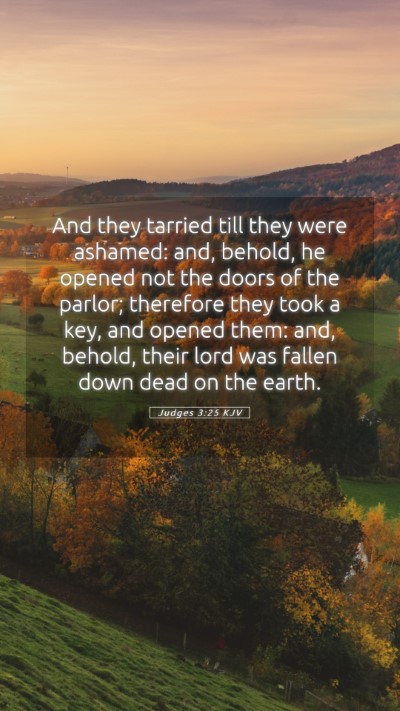Bible Verse Explanation: Judges 3:25
Judges 3:25 states, "And they tarried till they were ashamed: and, behold, he opened not the doors of the parlour; therefore they took a key, and opened them: and, behold, their lord was fallen down dead on the earth." This verse belongs to the narrative surrounding the defeat of King Eglon of Moab by Ehud, an Israelite judge. Understanding this passage requires a deep dive into the cultural, historical, and textual context.
Bible Verse Meanings
The verse demonstrates an important moment in Israel's history, encapsulating themes of divine judgment, human agency, and the irony often found in the downfall of oppressors. The delay of Eglon's servants signifies not only their ignorance of the events unfolding but also the complete control and sovereignty of God over the situation.
Commentary Insights
- Matthew Henry: He notes that Eglon’s demise is symbolic of God’s judgment on those who oppress His people and that the servants were blinded to the reality of their lord's fate due to their assumptions and expectations.
- Albert Barnes: He expounds on the psychology of the servants, pointing out how their shame in waiting reflects their own moral state. Their hesitance to act until it is too late illustrates a broader human tendency to misjudge situations based on appearances.
- Adam Clarke: Clarke emphasizes the sense of irony and dramatic tension in the scenario. The waiting period of the servants illustrates a critical moment where their role becomes one of both observers and tragic figures, encapsulating God's plan for justice.
Scripture Analysis
The significance of this verse extends beyond mere historical narrative; it serves as a commentary on obedience, delay, and the ultimate control of divine providence. Israel's deliverance through Ehud showcases how God’s plans can transcend human understanding and timelines.
Biblical Exegesis
From an exegetical standpoint, Judges 3:25 can be analyzed through the lens of how God uses unlikely instruments for His purposes. Ehud's cunning and the eventual public shame of Eglon's servants reflect profound truths about the nature of God’s justice that often plays out in unexpected ways.
Applications of the Verse
This verse invites readers to reflect on the dynamics of trust and reliance on divine timing. It speaks to the human experience of waiting for answers or resolution, encouraging believers to lean on faith instead of visible circumstances.
Significance in Daily Life
For those engaged in Bible study groups or online Bible study, this narrative serves as a reminder of the importance of faith in the midst of uncertainty and the assurance that God’s justice will prevail. The lesson drawn from this passage is relevant today, encouraging introspection about personal timing and Divine providence.
Related Bible Cross References
- Judges 3:12-30: The overall narrative of Ehud’s deliverance and Israel's oppression.
- Romans 12:19: God's vengeance in the context of justice and divine appointment.
- Proverbs 21:30-31: The interplay between human plans and God’s ultimate sovereignty.
Bible Study Insights
For readers looking for Bible study guides, this verse can inspire discussions around the themes of justice, timing, and the unpredictability of God’s methods. It raises questions about how we perceive leadership and authority in our lives.
Understanding Scripture
In understanding scripture, it is invaluable to consider both the immediate text and the broader narrative of the Bible, which often includes patterns of rebellion and redemption. Emphasis can be placed on how this verse serves as a microcosm of the larger biblical story of God’s covenant with His people.
Conclusion
In summary, Judges 3:25 offers profound insights into the nature of God's plan and timing. As seekers explore Bible verse interpretations and Bible study topics, this verse encourages both reflection and action in trusting God’s overarching sovereignty.


